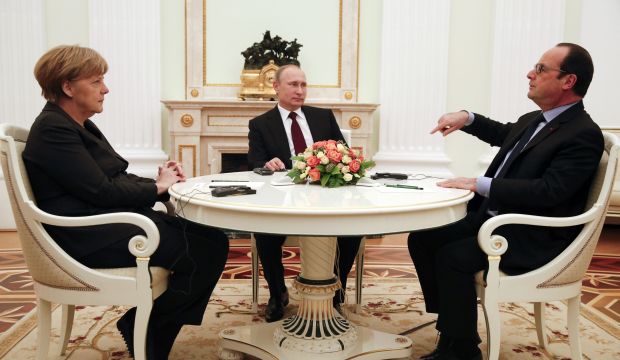
German Chancellor Angela Merkel and Russia’s President Vladimir Putin (C) listen to French President Francois Hollande during a meeting to find a resolution to the conflict in Ukraine, in Moscow, on February 6, 2015. (Reuters/Maxim Zmeyev)
Munich, AP—German Chancellor Angela Merkel said Saturday it is uncertain whether a flurry of diplomacy aimed at resolving the crisis in Ukraine will succeed, and warned that there are no guarantees that any deal would stick.
Merkel, speaking after two days of hastily arranged meetings in Kiev and Moscow, also bluntly underlined her opposition to the idea of supplying lethal weapons to the Ukrainian government.
Merkel offered no details of the proposals that have been thrashed out over recent days, which she plans to discuss in a phone call Sunday with Russian President Vladimir Putin, Ukrainian President Petro Poroshenko and French President Francois Hollande.
The urgent diplomacy comes as Western anxiety over the conflict grows and sanctions bite ever harder on Russia’s economy. More than 5,300 people have been killed since fighting began in April, according to a UN tally, and the bloodshed has markedly increased over the past two weeks.
The resurgent fighting has prompted the US to consider giving lethal weapons to Ukraine, an option opposed by European nations.
Negotiators’ aim is to draw up a possible joint document on implementing the much-violated September peace deal concluded in Minsk, Belarus.
“This conflict cannot be resolved by military means,” Merkel said at the Munich Security Conference. “It is all the more important now to set out substantial steps that serve to fill with life the Minsk agreement.”
Merkel said of the talks that “it is uncertain whether they will be successful, but it is from my point of view and that of the French president in any case worth making this attempt.”
The German leader acknowledged that experience to date of agreements being violated on the ground has been “disillusioning.”
Asked whether there are any guarantees a new agreement will not suffer the same fate, she replied that “there are no theoretical guarantees.”
“After such experiences, I am very cautious with guarantees,” she said. “The guarantee can only be keeping to what has been agreed . . . but the answer can’t be not to make any more agreements. Of course we have to try again and again, at least I think so.”
The United States and other Western countries contend Russia has supplied troops and equipment to the separatists in eastern Ukraine who have been fighting Ukrainian government forces since April. Russia denies the claims.
Merkel said she is “very doubtful” about the wisdom of supplying lethal defensive weapons to Ukraine, underlining fears in Europe that a move advocated by some in the US would merely make the situation worse.
“The problem is that I cannot imagine any situation in which improved equipment for the Ukrainian army leads to President Putin being so impressed that he believes he will lose militarily,” she said. “I have to put it that bluntly.”
Merkel’s speech was attended by Ukrainian President Petro Poroshenko and US Vice President Joe Biden. She planned to hold a three-way meeting with both on the sidelines.
Russian Foreign Minister Sergey Lavrov and US Secretary of State John Kerry are also attending the conference.
